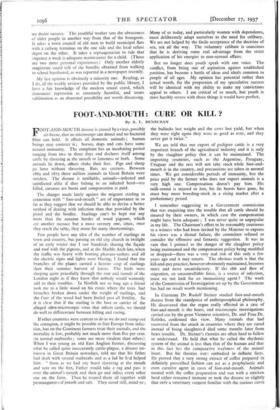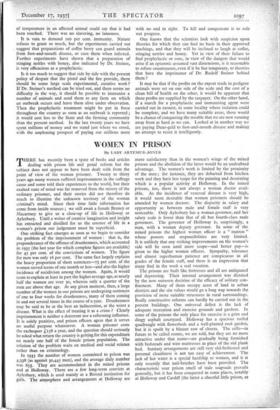FOOT-AND-MOUTH : CURE OR KILL ?
By S. L. BENSUSAN
FOOT-AND-MOUTH disease is caused by a virus, possibly air-borne, that no microscope can detect and no bacterial filter can hold. It affects all domestic animals ; human beings may contract it ; horses, dogs and cats have some natural immunity. The complaint has an incubating period ranging from two to three days and declares itself among cattle by slavering at the mouth or lameness or both. Some animals lie down, others shake their feet. Pigs and sheep go lame without slavering. Rats are carriers. Between 1869 and 1872 three million animals in Great Britain were stricken. The disease is notifiable, animals—infected and uninfected alike if they belong to an infected herd—are killed, carcases are burnt and compensation is paid.
The charges made lately against the migrant starling in connexion with " foot-and-mouth " are of importance in so far as they suggest that we should be able to devise a better method of dealing with infection than that provided by the pistol and the bonfire. Starlings can't be kept out any more than the autumn hordes of wood pigeons, which are another menace but a more savoury one, since, once they reach the table, they atone for many shortcomings.
Few people have any idea of the number of starlings in town and country, but passing an old city church in twilight of an early winter day I saw hundreds sharing the facade and roof with the pigeons, and at the Marble Arch late, when the traffic was heavy with homing pleasure-seekers and all the electric signs and lights were blazing, I found that the branches of the planes carried a heavier crop of starlings than their summer harvest of leaves. The birds were sleeping quite peacefully through the roar and tumult of the London night as if they knew that nobody would wantonly add to their troubles. In Norfolk not so long ago a friend took me to a little wood on his estate where the trees had branches broken down under the weight of starlings, and the foor of the wood had been fouled past all fertility. So it is den that if the starling is the host or carrier of the alleged ultra-microscopic virus that infects cattle, we should do well to differentiate between killing and curing.
Mother countries were content to do as we do and stamp out the contagion, it might be possible to free Europe from infec- tion, but on the Continent farmers treat their animals, and the mortality is low, probably not much more than five per cent. (in normal outbreaks ; some are mere virulent than others). When I was young an old East Anglian farmer, discussing what he called quite inaccurately cattle-plague, a disease un- known in Great Britain nowadays, told me that his father had dealt with several outbreaks and as a lad he had helped him. " Soon as we had any beast slavering at the mouth and sore on the feet, Father would take a rag and pass it over the animal's mouth and then go and infect every other one on the farm. Then he treated them all together with permanganate of potash and salt. They stood still, mind ye ; the bullocks lost weight and the cows lost yield, but when they were right again they were as good as ever, and they never got it twice."
We are told that our export of pedigree cattle is a very important branch of the agricultural industry and it is only by the slaughter policy that it can be maintained. The importing countries, such as the Argentine, Paraguay, Uruguay and the rest will not take stock while foot-and- mouth is in the country, and precautions are taken in normal times. We get considerable periods of immunity, but the price paid by the farmer who does not export animals is a very high one. Compensation doesn't pay him. His milk-round is injured or lost, his fat beasts have gone, he must buy more breeding-stock in a rising market after a probationary period.
I remember suggesting to a Government commission that was enquiring into the trouble that all cattle should be insured by their owners, in which case the compensation might have been adequate ; I was never quite so unpopular in my life. The Chairman's effort to be reasonably courteous to a witness who had been invited by the Minister to express his views was a dismal failure, the committee refused to consider the offensive and fantastic suggestion. It was in vain that I pointed to the danger of the slaughter policy being maintained and the compensation policy being modified or dropped—there was a very real risk of this only a few years ago and it may return. The obvious truth is that the kill-and-pay practice, however obstinately maintained, becomes more and more unsatisfactory. If the ebb and flow of migration, an uncontrollable force, is a source of infection, must we not look for an immunising agent ? The work of the Commission of Investigation set up by the Government has had no result worth mentioning.
In Germany Dr. Rudolf Steiner studied foot-and-mouth disease from the standpoint of anthroposophical philosophy. He discovered that the organ really affected in a case of foot-and-mouth is the heart, and microscopic investigations carried out by the great Viennese scientists, Dr. and Frau Dr. Kolisko, confirmed this view. Many animals that had recovered from the attack in countries where they are cured instead of being slaughtered died some months later from heart trouble. Dr. Steiner's theories are often hard to follow or understand. He held that what he called the rhythmic system of the animal is less than that of the human and that in this fact lies the comparative weakness of the animal heart. But his theories v.-el.! embodied in definite facts. He proved that a very strong extract of coffee prepared in definitely prescribed fashion can act as a prophylactic and even curative agent in cases of foot-and-mouth. Animals treated with the coffee preparation and run with a stricken herd either remained immune or took the disease so slightly that only a veterinary surgeon familiar with the curious curve of temperature in an affected animal could say that it had been touched. There was no slavering, no lameness.
It is vain to demand too per cent. immunity. Nature refuses to grant so much, but the experiments carried out suggest that preparations of coffee berry can guard animals from foot-and-mouth disease, or cure them when infected. Further experiments have shown that a preparation of stinging nettles with honey, also indicated by Dr. Steiner, is very efficacious as a prophylactic.
Is it too much to suggest that side by side with the present policy of despair that the pistol and the fire provide, there should be some large scale experimental, curative work ? If Dr. Steiner's method can be tried out, and there seems'no difficulty in the way, it should be possible to immunise a number of animals and send them to any farm on which an outbreak occurs and leave them alive under observation. Then the prophylactic treatment might be put in force throughout the country as soon as an outbreak is reported ; it would cost less to the State and the farming community than the present method. In the last twenty years we have spent millions of money and we stand just where we stood, with the unpleasing prospect of paying out millions more with no end in sight. To kill and compensate is to rule out progress.
One knows that the scientists look with suspicion upon theories for which they can find no basis in their approved teachings, and that they will be inclined to laugh at coffee, stinging nettles and honey. Yet in view of their failure to find prophylactic or cure, in view of the dangers that would arise if an epizootic assumed vast dimensions, is it reasonable to refuse countenance, even if it be but temporary, to theories that have the imprimatur of Dr. Rudolf Steiner behind them ?
It may be that if the profits on the export trade in pedigree animals were set on one side of the scale and the cost of "a clean bill of health on the other, it would be apparent that these profits are supplied by the taxpayer: On the other hand, if a search for a prophylactic and immunising agent were carried out in earnest, in some locality where isolation could be complete, and we have many suitable areas, there would be a chance of conquering the trouble that we are now running away from as hard as we can. Looked at in another way we are paying Dane-geld to foot-and-mouth disease and making no attempt to resist it intelligently.















































 Previous page
Previous page